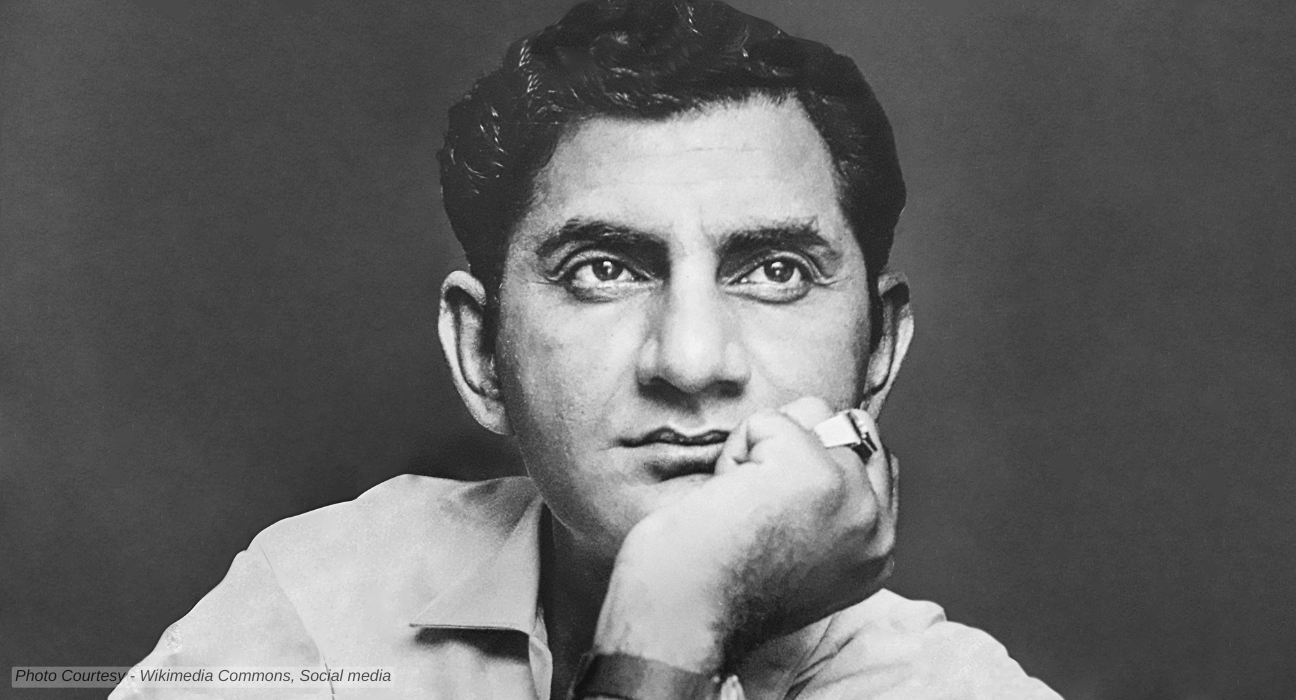One of the most celebrated and respected lyricists, Anand Bakshi, is a legendary figure in Indian cinema. In his career of over four decades, he wrote over 4000 songs. He also get record 37 nominations of the Filmfare Award for Best Lyricist.
Early Life and Career
Anand Bakshi was born on July 21, 1930, in Rawalpindi, now in Pakistan. He moved to Delhi with his family after the partition of India. Despite the challenges, Bakshi’s love for poetry flourished. He joined the Indian Navy, but his heart was set on a different course—he yearned to be part of the Hindi film industry.
After a series of struggles and odd jobs, Bakshi got his first song in the 1957 film “Sher-e-Baghdad”, where he wrote the ‘Shamshad Begum’ number “Valle Valle Vai O Valle Vai” under music director “Jimmy”. Bakshi got noticed for his song “Dharti Ke Lal Na Kar Itna Malaal” in the 1958 film “Bhalaa Aadmi”, under Nisar Bazmi. In his early career, he mostly wrote for B-grade movies like “Miss Toofan Mail”, “Khoobsoorat Dhokha”, and “Tin Tin Tin”.
Breakthrough of Anand Bakshi

His qawwali “Meri Tasveer Lekar Kya Karoge Tum” for the 1962 film “Kala Samundar“, composed by N. Datta, and “Mere Mehboob Qayamat Hogi” in “Mr X in Bombay“, composed by Laxmikant Pyarelal, were his early hits and paved the way for big films. Films like “Mehendi Lagi Mere Haath (1962)“, followed by “Jab Jab Phool Khile (1965)“, and “Himalaya Ki God Mein (1965)“, under the music direction of “Kalyanji & Anandji“, made him a star.
Songs like “Pardesiyon Se Na Ankhiyan Milana”, “Ek Tha Gul Aur Ek Thi Bulbul”, “Ye Samaa Samaa Hai Pyar Ka”, “Chand Si Mehbooba Ho Meri”, and “Ek Tu Na Mila” became chartbusters, establishing him as the leading lyricist of the time.
On the Top
Anand Bakshi followed this early success with “Milan (1967).” With “Sawan Ka Mahina” from Milan becoming the new love anthem, Anand Bakshi went on to write countless popular songs. Some of his other notable films include “Aasra,” “Aaye Din Bahar Ke,” “Anita”, “Farz”, “Devar”, “Chandan Ka Palna”, “Aamne Samne”, “Raja Aur Runk”, “Aya Sawan Jhoom Ke”, “Jeene Ki Raah”, “Do Raaste”, “Aradhana,” and many more.
With “Aradhana,” he became a favourite lyricist of national heartthrob Rajesh Khanna’s and wrote for several of his films. These successes propelled him to immense fame, establishing his lyrics as the voice of a generation.
Bakshi’s career spanned over four decades, during which he wrote over 4000 songs for 638 films. His collaboration with music directors like Laxmikant-Pyarelal, R.D. Burman, and Kalyanji-Anandji resulted in some of the most memorable songs that are still cherished today. His ability to write simple yet profound lyrics made him a favourite among filmmakers and music lovers alike.
Continuing Success
From the ’70s till the late ’90s, Anand Bakshi was the number one choice of filmmakers. Giving hits after hits became a sort of habit of the prolific writer. He wrote memorable lyrics for many movies, including “Aan Milo Sajna”, “Kati Patang”, “Hare Rama Hare Krishna”, “Pushpanjali”, “Khilona”, “Amar Prem”, “Mehboob Ki Mehndi”, “Mera Gaon Mera Desh”, “Seeta Aur Geeta”, “Bobby”, “Julie”, “Sholay”, “Dharam Veer”, “Mr. Natwarlal”, and others in the 1970s.
In 1972, he made his singing debut in the film “Mom Ki Gudiya.” In the film he sang the duet “Baaghon mein bahaar aayi ” with Lata Mangeshkar. He also sang a solo “Main dhoondh raha tha sapnon mein.” In “Sholay” (1975), he sang bonus qawwali “Chand Sa Koi Chehera.” He also sang “Sun Banto Baat Meri Maha Chor (1976),” “Aaja Teri Yaad Aayi (Charas,1976),” and Jagat Musafir Khana (Balika Badhu, 1976).”
80s and 90s
In the 80s, some of his memorable films include “Abdullah,” “Aasha,” “Karz,” “Love Story,” “Shakti,” “Vidhaata,” “Arpan,” “Coolie,” “Desh Premee,” “Hero,” “Nagina,” “Meri Jung, “Karma,” “Ram Lakhan,” “Chandni,” “Tridev,” and many others.
From the 90s onwards, he started to cut off his work significantly but was still the most successful lyricist of the era with films like “Awaargi”, “Darr”, “Lamhe”, “Vishwatma”, “Hum”, “Mohra”, “Banjaran”, “Khalnayak”, “Dilwale Dulhania Le Jayenge”, “Pardes”, “Heer Raanjha”, “Dushman”, “Dil Toh Pagal Hai”, “Taal”, “Zakhm”, “Mohabbatein”, “Gadar: Ek Prem Katha”, “Aśoka,” and “Yaadein.”

Personal Life
Anand Bakshi was married to Kamla Mohan Bakshi. Together they had two daughters, Suman Datt and Kavita Bali, and two sons, Rajesh Bakshi and Rakesh Bakshi. Bakshi Saab passed away on March 30, 2002, at Mumbai’s Nanavati Hospital, at the age of 71
Anand Bakshi on IMDB













Leave feedback about this